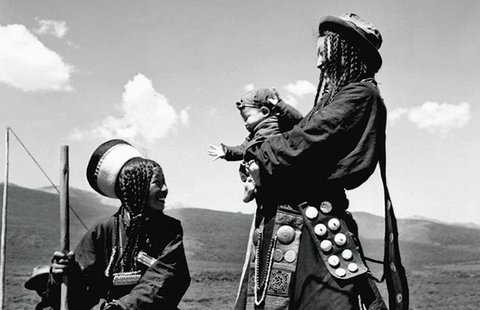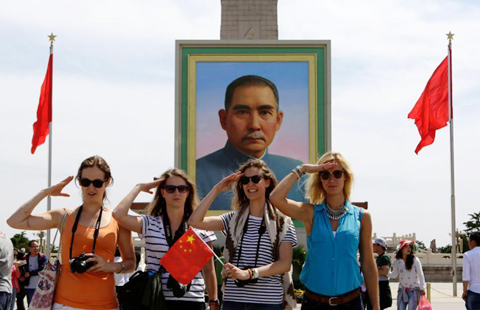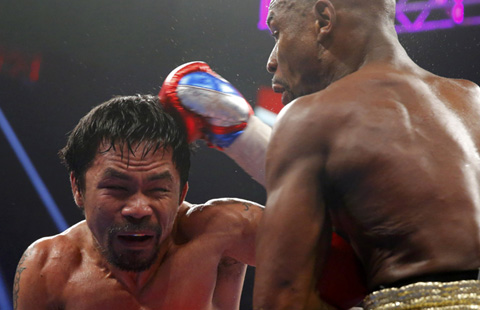S.Korean president urges Abe to face up to history
Updated: 2015-05-04 13:58
(Xinhua)
|
||||||||
SEOUL - South Korean President Park Geun-hye on Monday urged Prime Minister Shinzo Abe to face up to its imperialistic history and apologize for wartime brutalities, citing Abe's speech to US Congress.
"The Abe government failed to take advantage of chances to making a sincere apology for historical issues, such as comfort women victims, and strengthen trust with neighboring countries. (His failure) is being criticized in the United States," Park told a meeting of senior presidential secretaries.
Abe became the first Japanese premier on April 29 to address the joint session of the US Congress, saying that he would " uphold" related statements made by his predecessors for the Imperial Japan's past brutalities.
However, he fell short of mentioning Japan's "colonial rule and aggression" and apologizing for wartime atrocities, causing strong criticism from neighboring countries, especially South Korea and China, as well as from some US politicians.
President Park said that Japan is being "buried in the past" as Abe and his cabinet failed to face up to history and reconcile with neighbors, noting that South Korea will push forward its two- track diplomatic strategy according to its existing convictions.
While pushing to make clear historical issues, diplomatic issues, including the US-South Korea alliance, China-South Korea relations and South Korea-Japan ties will be addressed separately with a clear aim and direction, said Park.
Her comments indicated no change in the Park administration's diplomatic strategy even amid worries that South Korea may be relatively alienated in diplomacy after revised guideline between Washington and Tokyo for defense cooperation.
The guideline allowed Japan to operate its self-defense forces on the Korean Peninsula to assist American troops without advance consent from South Korea.
Park's remarks also indicated no change in her unwillingness to meet face-to-face with Abe until he makes sincere apology for the comfort women victims.
At least 200,000 women, mostly from the Korean Peninsula, were forced into sexual slavery for Japanese military brothels before and during the World War II.
Without mentioning the comfort women victims, Abe just said in his speech last week that armed conflicts always made women suffer the most, seeking to justify the imperial Japan's recruitment of sex slaves.
- LA protesters confront Abe face to face
- Abe's efforts to revise pacifist constitution encounter mass protest at home
- S.Korea strongly regrets Abe's US Congress speech
- Protesters wrathful over lack of Abe apology
- Military issues past, present engulf Abe
- ROK's painful history must not be repeated by Abe's Japan
- Abe betrays history's conscience
- Abe offers no apology over wartime past in US Congress speech
- China hits out as Abe visits the US
- S.Korean civic groups urge Abe for sincere apology in US Congress

 Historical photos of 56 nations in China (Part I)
Historical photos of 56 nations in China (Part I)
 World No.1 Ma wins first men's singles world championship
World No.1 Ma wins first men's singles world championship
 Ten photos you don't wanna miss during May Day holiday
Ten photos you don't wanna miss during May Day holiday
 The world in photos: April 27 - May 3
The world in photos: April 27 - May 3
 Fans dressed up to celebrate 'Star Wars Day' in Budapest
Fans dressed up to celebrate 'Star Wars Day' in Budapest
 China pavilion opens at Expo Milano 2015
China pavilion opens at Expo Milano 2015 New exhibition by Fondazione Prada offers new perspective on originality and imitation
New exhibition by Fondazione Prada offers new perspective on originality and imitation
 Mayweather beats Pacquiao by unanimous decision
Mayweather beats Pacquiao by unanimous decision
Most Viewed
Editor's Picks

|

|

|

|

|

|
Today's Top News
China becomes top source of US immigrants
Birthing center witnesses charged with violating court orders
LA protesters confront Abe face to face
Baltimore mayor lifts curfew 6 days after riots
More speculation in China's market as it's new
Consul general praises Beijing university to alumni
Manufacturing hub starts work on first zero-labor factory
New York City police officer shot in head while conducting patrol
US Weekly

|

|






